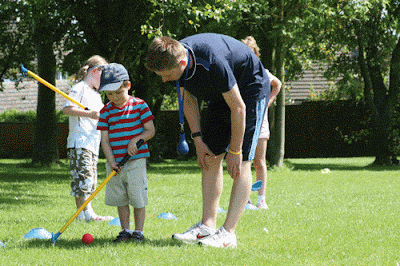When I was nine, our teacher wore dark glasses, grey nylon trousers and the smell of stale cigarettes. Every morning she instructed us to curtsey to a photograph of the queen and stand alone to recite our times tables. I remember the feeling of pointless repetition and disengagement. This was such a bleak contrast to the quiet embrace of the catholic nuns who had founded our convent. From then on I committed only to my friends and to my duty. I scraped by, doodling and dreaming until the year I went to tutorial college to re-take my A levels. There I discovered the poetry of Hopkins and became alive again to that 'dearest freshness deep down things'.
So when a friend asked me recently, 'what makes us choose the education we give our children? What's in it for the parents?' I sat down to unravel my memories and unpick the fabric of the different types of education I have offered my four children.
Eventually I found the red thread woven through my choices - my hope that my children will feel safe enough to remain present, passionate and curious. Dragged through foreign postings, divorce, remarriage and relocation they have attended international, preparatory, independent and public schools. I have tried to balance disruption by sometimes crippling us financially to find coeducational schools that help me to help my children move through their school years with clarity, integrity and vitality.
Faced with my own limitations and inadequacies, I have looked for schools willing to support me in trying to keep the children's bodies and their spirits strong and alive, encourage them to define their unique rhythm, learn to listen to others without losing themselves and be recognized for their inner drive not just their intelligence.
A friend, Linda, puts it simply, "Education needs to help them discover and remain alive to what really gets them out of bed in the morning."
Perhaps, when we consider where to educate our children, many of us are completing our own search and trying to redress imbalance with which we have struggled. Some of us choose to adhere to the safety of a system that is familiar and others make choices in opposing reaction to the education we were offered. We are fortunate to be in a position to choose.
Sarah, a mother at Lewes New School, recalled how, "It was exhausting being a success at school. I wasn't asked to make decisions about who I was, not encouraged to discover what my passions were - just to get the grades. We were driven by the fear of failure. When I came out at eighteen, the only goal I had was to go to university. We were told, 'keep going and the world will be your oyster'. Nobody told us about creative thinking and about how learning is such an amazing buzz. I want my children to have a thirst for knowledge, to experience a complete way of learning."
Our education system is taut with contradiction and cliché. So many schools, state and private, pay lip service to the importance of developing the whole child but their primary drive is to bolster their place on league tables. With glossy brochures and slick PR they subtly invite us to join an intellectual, social or creative elite. I know that I have made choices that have bolstered my ego and fed my desire to belong. If we were honest, we would admit that, sometimes, it is our own insecurities that shape our choices and fuel our fear that our children might not fit into the adult world or be able to adequately compete.
In his book, The Re-enchantment Of Everyday Life, Thomas Moore says, "Imagine a form of education that does not try to change the child or transform it into an adult, but rather provides a place where the child can flourish as a child....Such an education would ask the adults to be full of faith and trust that the child would discover the world and learn its nature and ways over time."
During the time that I was a single parent of three children, I understood the importance of the presence of the other adults in their lives: their grandparents, my siblings and girlfriends, our neighbours, their friends' parents and their teachers. A sense of belonging and of community is invaluable.
Now I am learning to stitch with the red thread. In Lewes New School, I have discovered a place where there is no uncomfortable seam between home and school, where I can place my trust and our two youngest children in a community where both child and parent experience the value of their unique contribution.
Perhaps it is time for us to learn to slow down enough to contemplate our choices, cease the drive to have and start to be; to listen to ourselves and to our children and allow them to live their own lives. We need to acknowledge what's in it for the parents. It's up to us to help our children find the balance between the person they know themselves to be and our hopes for everything that they can or might become.
Louisa Thomsen Brits
louisathomsen@btinternet.com, www.lewesnewschool.co.uk





